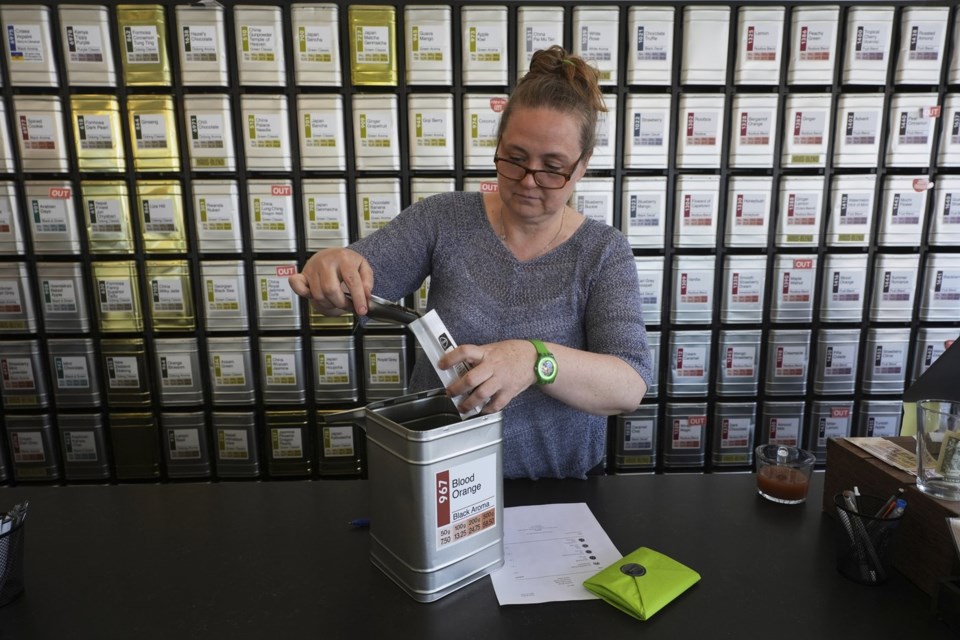NEW YORK (AP) ŌĆö Major orders canceled. Containers of products left stranded overseas. No roadmap for what comes next.
The Trump administration . Since then, small business owners who depend on imports from China to survive have become increasingly desperate as they eye dwindling inventory and skyrocketing invoices.
President Donald Trump when he said he expected the tariffs to come down ŌĆ£substantially.ŌĆØ That helped set off a rally in the stock market. But for small businesses that operate on razor-thin margins, the back and forth is causing massive upheaval. Some say they could be just months from going out of business altogether.
The Massachusetts family-owned game company
Game makers are particularly susceptible to the tariffs since are made in China, according to The Toy Association.
WS Game Co., based in Manchester-by-the-Sea, Massachusetts, is a family-owned business that licenses Hasbro board games like Monopoly, Candy Land and Scrabble and creates deluxe versions of them. Its most popular line of games come in boxes that look like vintage books and sell for $40.
The companyŌĆÖs games were featured in OprahŌĆÖs Favorite Things list in 2024 and sold in 14,000 stores in North America, from big national chains to mom-and-pop stores, said owner Jonathan Silva, whose father founded the company in 2000.
All of WS GameŌĆÖs production is done in China. The tariffs have brought the past 25 years of healthy growth to a screeching halt.
Over the past three weeks, WS Game has had three containers of finished games, worth $500,000, stranded in China. It lost orders from three of the largest U.S. retailers totaling $16 million in business. And thereŌĆÖs not much Silva can do about it.
ŌĆ£As a small business, we donŌĆÖt have the runway or the capabilities to move manufacturing on a whim,ŌĆØ said Silva, who has 22 employees. He said the tariffs have ŌĆ£disrupted our business and put us on the verge of insolvencyŌĆØ and estimates he has about a four-month runway to stay afloat if nothing changes.
ŌĆ£WeŌĆÖre really hoping that cooler heads prevail,ŌĆØ he said.
Artificial flowers in Kentucky
Jeremy Rice co-owns House, a home-d├®cor shop in Lexington, Kentucky, that specializes in artificial flower arrangements for the home. About 90% of the flowers his business uses are made in China.
Rice uses dozens of vendors. The largest are absorbing some of the cost of the tariffs and passing on the rest. One vendor is raising prices by 20% and another 25%. But Rice is expecting smaller vendors to increase prices by much higher percentages.
House offers mid-range artificial flowers. A large hydrangea head will retail for $10 to $16, for example. China is the only place that manufacturers higher quality silk flowers. It would take a vendor years to open a factory in a different country or move production somewhere else, Rice said.
Rice ordered his holiday d├®cor early this year. But even after stocking up ahead of the tariffs, he only has enough everyday floral inventory in to last two to three months.
ŌĆ£After that, I donŌĆÖt know what weŌĆÖre going to do,ŌĆØ he said.
Rice is concerned that the trade war will wipe out a bunch of mom-and-pop stores, similar to what happened in the Great Recession and the pandemic.
ŌĆ£ThereŌĆÖs nowhere to turn, thereŌĆÖs nothing to do,ŌĆØ he said.
Tea in Michigan
A tea shop in a Michigan college town is also caught in the middle of the ongoing tariff fight.
ŌĆ£ItŌĆÖs basically just put a big pit in my stomach,ŌĆØ said Lisa McDonald, owner of TeaHaus, located in Ann Arbor, home to the University of Michigan. McDonald has owned TeaHaus for nearly 18 years and sells tea to customers across the U.S.
Americans drank about 86 billion servings of tea in 2024, according to the Tea Association of the U.S.A.. Almost all of that is imported since tea isnŌĆÖt grown in the U.S. at scale, due to factors ranging from climate to cost.
McDonald imports loose-leaf tea from China, India, Kenya, Sri Lanka and other countries. She says her customer base is ŌĆ£from all over the U.S. and the world." But she worries there is a limit to what theyŌĆÖll spend. Her premium teas can cost up to $33 for a 50-gram bag.
ŌĆ£I donŌĆÖt think I can charge $75 for a 50-gram bag of tea, no matter how amazing that tea is,ŌĆØ she said.
McDonald understands TrumpŌĆÖs rationale for wanting to use tariffs to spur U.S. manufacturing but says it doesnŌĆÖt apply to the tea industry.
ŌĆ£We canŌĆÖt grow tea in the U.S. to the extent that we need. We canŌĆÖt just flip the industry and ŌĆśmake tea great againŌĆÖ in America. It just canŌĆÖt happen,ŌĆØ she said.
Car accessories in Oklahoma
Jim UmlaufŌĆÖs business, 4Knines, based in Oklahoma City, makes vehicle seat covers and cargo liners for dog owners and others. To do so, he needs raw materials such as fabric, coatings and components from China.
Umlauf has explored manufacturing in countries other than China since 2018, when Trump first instituted a 25% tariff on goods from China, but has run into complications. In the meantime, 4Knines absorbs the extra cost, which Umlauf says has limited its growth and squeezed its margins.
Now, the new tariffs make it nearly impossible to do business. The demand is there, but the company canŌĆÖt afford to bring over more products.
ŌĆ£We only have a limited amount of inventory left, and without some relief, weŌĆÖll run out soon,ŌĆØ Umlauf said.
As a small business owner who has worked hard to develop a high-quality brand, create jobs and contribute to the community, Umlauf is frustrated. He has tried to contact the White House and other decision-makers to ask for small business support. But he's gotten zero response.
ŌĆ£ItŌĆÖs time for policymakers to consider the full impact of trade policies not just on stock prices or global competitiveness, but on the real people running small businesses,ŌĆØ he said.
___
AP videojournalist Mike Householder in Detroit contributed to this report.
Mae Anderson, The Associated Press




